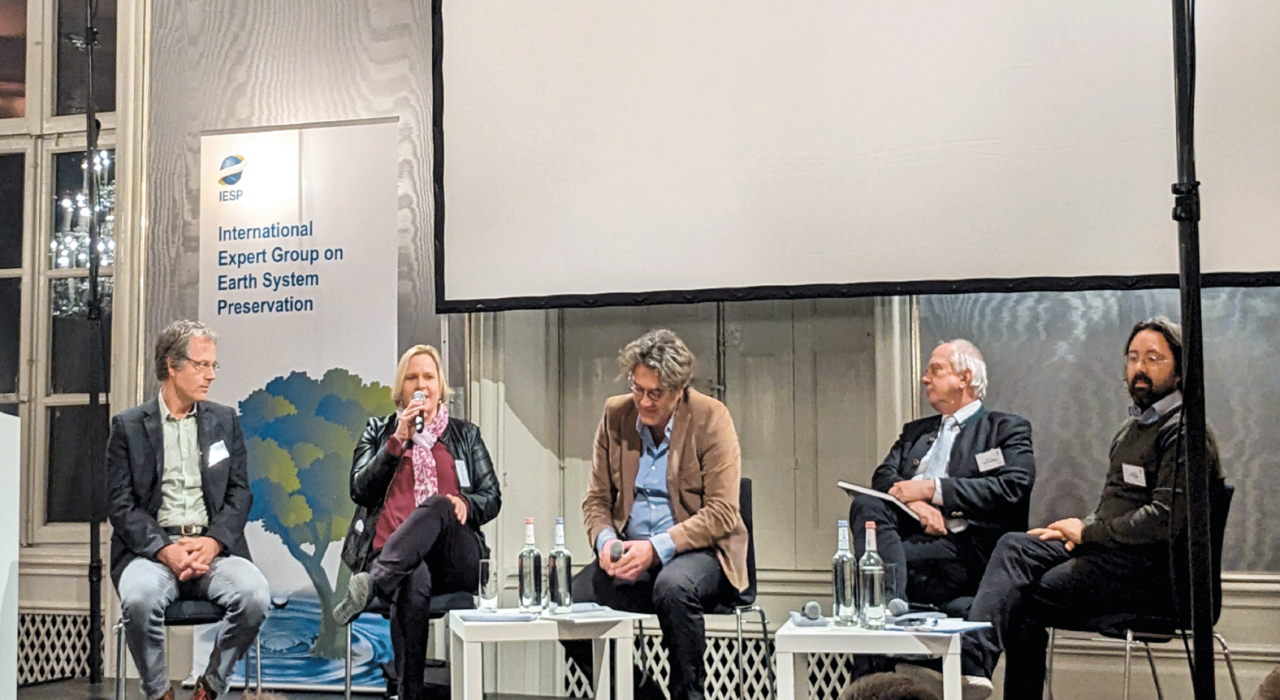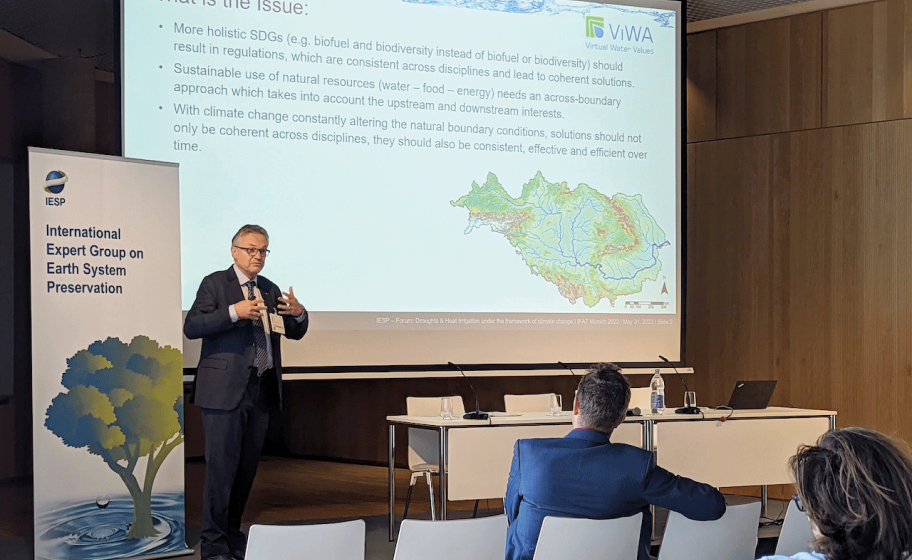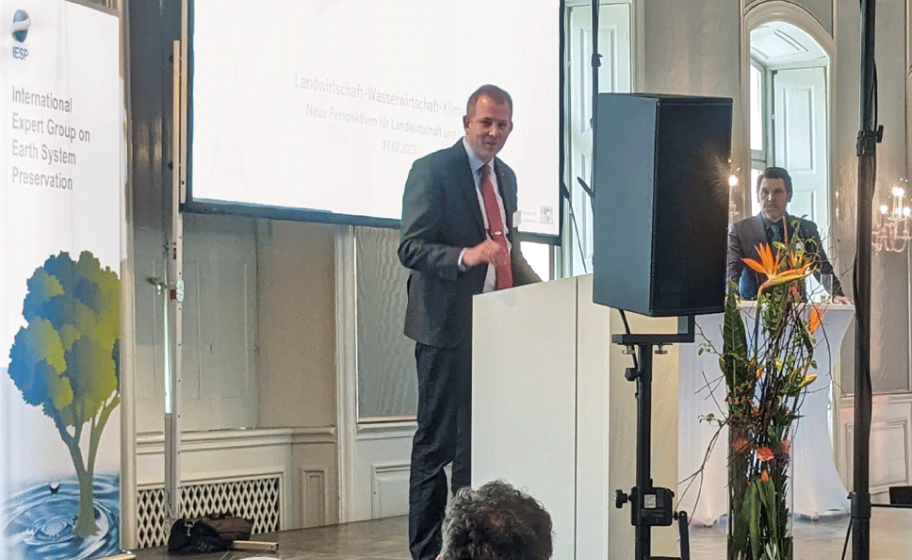IESP e. V. An International Expert Network
In which environment do we want to live in the future?
Towards the end of five years the project “Agriculture – Water Management – Climate Change. New perspectives for agriculture and the environment” (granted by the Bavarian Ministry of Environment and Consumer Protection), special attention was paid to public outreach and documentation of results.

Sustainable water (re)use
Using and reusing resources efficiently was the top theme at the IFAT Munich Congress and Exibition 2022, world trade fair for water and waste management. Circular Economy as the overarching theme connecting supporting programs, exhibitions as well as the special areas, offered visitors a platform to discuss in a variety of settings the effects of climatic changes exacerbating in extended droughts and extreme heat waves. To address these challenges, changes in water (and waste) management will be necessary.
The IESP Forum Drought and Heat, held on the second day of the fair, May 31, 2022, focused on the sustainable (re)use of water resources. Prof. Wolfram Mauser from Ludwig-Maximilians-University Munich (LMU) gave an overview of the systemic interrelationships within the Water-Food-Energy Nexus of water supply, food cultivation and energy production in the Danube region. Using satellite data and models, he highlighted the potential of effective irrigation methods for intensified farming. It is thereby possible to double yields, yet at the risk of massive runoff of surface waters. An economic analysis shows that the gain in food production outweighs the loss in energy production along the river Danube by far. However, agricultural conversion could return land to nature as compensation areas. This would make a significant contribution to climate and biodiversity protection globally and locally. A multinational area, such as the Danube basin, poses considerable challenges to intergovernmental knowledge, data exchange, and cross-border state administration. At the same time, the necessary agro-structural transformation of the post-communist states enables far-reaching innovations to integrate measures of nature, environment and climate protection.
Prof. Jörg E. Drewes of the Technical University of Munich (TUM) used small-scale irrigation demand data to demonstrate the effectiveness and possibilities of using municipal waterwater effluents after advanced treatment for agricultural and landscape irrigation purposes. Multi-stage, modular purification processes are currently being researched within the framework of the BMBF-funded ‘Nutzwasser’ project with a demonstration-scale test site in Schweinfurt, Lower Frankonia. This region is already suffering from dwindling water supplies and resulting conflicts of use. Different quality levels and irrigation techniques are being tested in parallel to demonstrate a save reuse practice for the cultivation of crops eaten raw. This form of utilizing alternative water resources will become increasingly important as global temperatures rise. Regional climate change also result in weather extremes, which affect the availability of local ground and surface water supplies as well as their quality. Local water reclamation therefore offers a financially viable possibility for small and medium-sized entrepreneurs to become climate change resilient. Thus, the effective use of recycled water cannot only strengthen a local economy, but entire rural areas. At the same time, water reuse contributes to environmental protection and nature conservation in the respective region.
The lively discussion following a summarizing commentary by Dr. Klaus Arzet of the Bavarian Ministry for the Environment and Consumer Protection (StMUV) iterated the complex interrelationship between environmental, nature and climate protection, but also the challenges arising from comprehensive approaches to solutions and their implementation. The benefit of a direct comparison of large complex systems and small local initiatives was clearly evident. Positive feedback from representatives of farmers' associations as well as state and federal regulatory administration further expressed the necessity for open and continued dialogue between professionals of the sectors water management and agriculture in order to jointly develop sustainable solutions for the challenges posed by anthropogenic overuse of resources and climate change in an often lobby driven political environment.

Sustainable global supply chains
The “farmers’ protests” of recent years made the challenges of domestic producers are facing in Bavaria, Germany, and Europe widely visible. Little political mitigation has been taken even though experts from the fields of agriculture and water management, nature and climate protection, and economy have been concerned about the impact of globally linked food production on biodiversity, environmental landscape, but also farmers for many years. With effect of January 1, 2023, the German federal government’s Supply Chain Sourcing Obligations Act (LkSG) aims to bring attention to both the environmental and social effects of international trade connections.
In June 2022, the IESP workshop “Supply Chains of the Food Industry” looked into the global connections of agriculture, consumption, and food production, staged at the premises of Schloss Blumenthal near Aichach under the patronage of the StMUV and the Bavarian State Institute for Agriculture (LfL). Participants of the workshop discussed the topic of supply chains in the food industry in general, and from the perspective of sustainable development. It not only considered economic and social, but also ecological aspects, against the background of the prospective implementation of the German Supply Chain Sourcing Obligations Act, and the ongoing EU activities to introduce a framework directive on “sustainability obligations of companies.” Even before coming into effect, the law presented itself as a unique initiative for global sustainability.
The LkSG requires companies to make transparent their suppliers and ensure meeting certain social and environmental standards. The German law translated into respective national law can take international effect. Quite revolutionary is the clause that can hold company boards individually accountable. It has the potential to positively impact local agriculture and food production. It can strengthen the markets, individual producers, favor smaller enterprises and producers. With removing economic pressure from the local market and farmers, it removes environmental stress. The LkSG thereby supports the social transition to a future proof, sustainable 21st century agricultural system:
- Sustainability and fairness along global supply chains mutually enforce each other.
- Sustainability is not a state of affairs, but an ongoing process that requires everyone to take responsibility.
- Sustainability only works if the value of food is worth enough – when its true cost is accounted for people and the environment.
The workshop focused on the diverse, but specific aspects of the food industry and thus addressed a topic that had been widely neglected so far. In the workshop context, the food economy included producers (farmers), processors (food industry), and distributors (discounters, retailers), and thus sometimes long, complex, and international supply chains. The presentations highlighted the legal, ethical and economic aspects of the LkSG and ongoing EU activities and dealt with questions of practical implementation using practical examples, including the example of a discounter. It was the last workshop in a series of events, which will be concluded by March 2023.
Nutrition and land use in the Anthropocene
Over the project term, it became increasingly obvious that food and nutrition – in consumption, distribution, and production alike – are crucial to the human community in adapting to a rapidly progressing climate change. Therefore, this topic framed the concluding project event on February 27, 2023, which attracted a heterogeneous audience from science, economy, political administration, and civil society. The IESP network presented their recommendations for action formulated in the course of three workshops, supported by online discussions surrounding the 2021 expert report for the Bavarian State Chancellery on the Free State’s future water security. In the afternoon of the half-day event at Munich’s Nymphenburg castle, invited comments on the workshop findings stressed the well-known discrepancy between well-researched, validated knowledge on problems arising at the nexus of agriculture, water management, and climate change; and the (political) implementation deficit of at least 25 years that drives today’s climate protests. Here, another important issue to overcome is the communication between political and administrative departments’ or “ivory tower conversations.” This could hold the key to upscaling and synergizing departmental research, targeted towards the same direction, thereby including all those “in the field” concerned with implementing measures. In the evening, Prof. Hans Hauner, TUM, lectured about diet and nutrition influencing individual and public health, and the role of an unregulated Janus-headed industry of processed foods. A subsequent stage discussion on sustainable land and water use in (agricultural) food production concluded the event.
Sustainable landscape engineering
Further developing the topic of health-beneficial and healthy landscapes with resilient landscape hydrology, the IESP secured funding for a 2-year-feasibility study by the Bavarian State Chancellery. In collaboration with local partners in Tunisia, the project will generate insights on the possibility to stabilize local groundwater supplies by water reuse and reforestation. It builds upon the Tunisian Master Plans 2050 for Water Use and Reuse. Dwindling water resources in combination with increasing temperatures and extreme weather events are of global concern beyond the Mediterranean. The project also intends to learn from a country with 2000 years of experience in drought management. The interdisciplinary research team will be rooted at the TUM chairs for Ecoclimatology and Urban Water Systems Management as well as the TUM-IAS.
